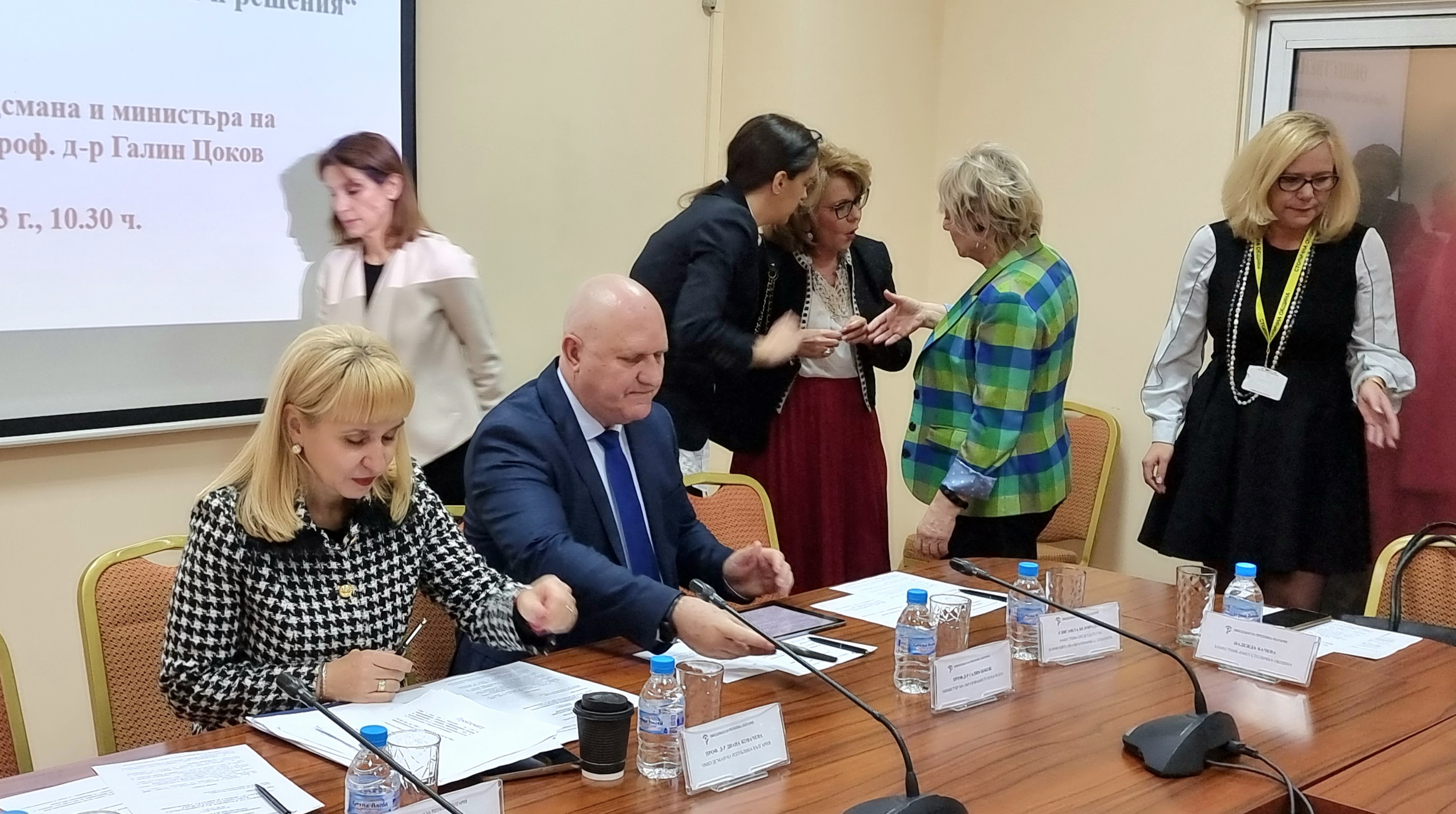News
The Ombudsman engages the institutions on the problems of children with special educational needs

30 November 2023
“For me, issues related to inclusive education and the problems of children with special educational needs have been a cause for years. We have taken a small step, we have succeeded in securing BGN 8 million in additional funds, which we were able to request during the budget deliberation and which were allocated with the awareness that it is neither enough nor a final solution to the problem.” This was stated by Ombudsman Diana Kovacheva at the opening of today's discussion entitled “Inclusive education – problems and solutions”, organized by the public defender, jointly with the Minister of Education and Science Prof. Galin Tsokov.
The discussion is part of the Ombudsman's National Campaign “For the Rights of Children and People with Disabilities”, within the framework of which, at the insistence of Prof. Kovacheva, BGN 8 million in additional funds were provided for inclusive education of children with SEN for 2023.
The discussion was also attended by the Chairman of the Education Committee in the National Assembly Krasimir Valchev, the Deputy Mayor of Sofia Municipality responsible for the Social Activity and Integration of Persons with Disabilities Nadezhda Bacheva, the Head of the Regional Education Department in Sofia Vanya Kastrova, university teachers, parents, directors of educational institutions, directors of resource centres for inclusive education from Sofia, Plovdiv, Pazardzhik, experts, etc.
Prof. Kovacheva emphasized that children with special educational needs needed attention and care, and they must be provided with time, resource teachers, relevant aids and materials, and attention, so that the constitutionally guaranteed right to education can apply to these children as well.
In addition, she pointed out that children with SEN, when provided with care, attention and a professional approach, would be able to develop at their own pace and achieve results that would enable them to live a normal life.
The Ombudsman highlighted the problems in this area: 10,000 children with special needs and disabilities are effectively excluded from the education system, the educational process for these children is ineffective, 70% of kindergartens and schools in Sofia do not have accessible environment, unprepared teachers to work with special children in a common classroom, lack of teacher assistants. She also drew attention to the fact that the issues of children with SEN and their parents were not considered with sufficient understanding.
“The idea of today's discussion is not only to discuss all the issues, but also to practically announce proposals and solutions on what could be done so that these children can fit into the environment,” the Ombudsman added.
Among the proposals to address the problems is to ensure adequate funding for the special groups at kindergartens, more specialists on the spot and at schools and kindergartens, work with parents, training of all pedagogical and non-pedagogical specialists in general and special groups, creating a model for collective work of pupils who are on individual or combined forms of education in specially equipped rooms for them when they do not attend common classes, creating the possibility of full-time education.
Prof. Kovacheva also paid special attention to human resources such as work at universities, internship programmes, curricula and teacher training. She emphasized the need for higher general resource support standards and standards for children in special groups, a new teacher's aide standard, and one for the creation of special development teams in schools to undertake collective work with pupils. She also pointed out the need to include targeted modules for projects aimed at children and pupils with SEN in the national programmes of the Ministry of Education and Culture.
“The policy on inclusive education is perhaps one of the most important policies launched at the adoption of the new Pre-school and School Education Act, because the concept of supporting a child's personal development is a fundamentally new concept in our education. Perhaps that is where the many difficulties in its implementation come from, as well as the lack of human resources and sufficient funding at the beginning, but for nearly half a year, since I have been at the head of the Ministry of Education and Science, one of the important priorities in the work of our political team is the opportunity to develop practices for inclusive education, inclusive school and inclusive classroom”, said the Minister of Education and Science Prof. Galin Tsokov.
He stressed that the maintenance standard for children with special educational needs in the education system would increase by 7% next year.
“Every year, the regional education directorates produce very detailed reports on the state of inclusive education in the country's individual regions. One of the conclusions is that the number of children with special educational needs is increasing, with a total of 24,541 children and pupils at kindergartens and schools. There are 6,052 children at kindergartens and pre-school groups, and 18,489 pupils at schools from first to twelfth grades”, added Minister Tsokov.
He agreed with the Ombudsman that there was a lack of sufficiently qualified professionals.
“The total number of pedagogical specialists appointed during the 2023-2024 school year in all kindergartens and schools connected to inclusive education is 5,526. Of these, 1,535 are resource teachers, 957 are speech therapists, and 90 are hearing and speech rehabilitators, 134 are teachers for visually impaired children, 11 are teachers for hearing impaired children, 841 are pedagogical advisors, 16 are teachers for children with mental retardation, 466 are educators, 103 are pedagogues and other specialists,” said the Minister of Education.
He emphasized that there were difficulties with adapting the educational content for children with special educational needs and explained that such children, who have additional support, study on individual programmes and on individual curricula.
“The scale of personalised education is serious, that is why, over the years since the adoption of the Pre-School and School Education Act and related by-laws, efforts have been made to adapt the educational content as well,” the Minister of Education pointed out.


